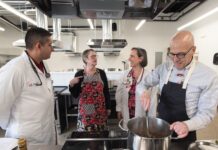
Over the past 10 years, Tom Schlindwein noticed it gradually became more difficult to follow conversations in public places.
“I have most difficulty in a restaurant or a venue where there is a lot of background noise,” Schlindwein said.
The 69-year-old Schlindwein is not alone. Many people find that as they get older, they have difficulty understanding conversations in crowded rooms or when there is significant background noise. Although hearing aids can help, age-related hearing loss can result from not only reduced loudness of speech, but also changes in central auditory processing in the brain. Thus, even with a hearing aid, people may find that understanding speech in noise is a problem.
“I have talked to people with hearing aids who say they do not work well in these situations,” Schlindwein said. “If there is an alternative, I am eager to pursue it.”
Schlindwein is participating in a clinical trial being conducted by researchers at the University of Louisville Program in Audiology for an investigational medication, AUT00063. The drug was developed for adults with age-related hearing loss and difficulty understanding speech in noisy environments.
Jill Preminger, PhD, chief of the Division of Communicative Disorders in the Department of Otolaryngology at UofL, is leading the trial of AUT00063, developed by Autifony Therapeutics. She said this medication, which focuses on improving brain-related aspects of age-related hearing loss, may be the first to help individuals with this condition.
“There have been very few drug studies for age-related hearing loss, yet approximately 45 percent of people over the age of 45 have some degree of hearing loss,” Preminger said.
Understanding speech involves distinguishing between similar sounds (such as p and b). These distinctions rely on not only reception by hair cells in the cochlea, which are lost with age, but on optimal function of auditory processing mechanisms in the brain.
“This drug is not targeting an improvement in hearing thresholds (i.e. making things louder), rather it is targeting how sound is processed in the auditory areas of the brain. This may result in improved hearing in noise,” Preminger said.
Coordinators are seeking additional individuals, age 50 to 89, with age-related hearing loss to participate in the trial. Qualified individuals are those who experience difficulty understanding speech against high background noise but do not use hearing aids. Subjects accepted for the study will receive evaluations by an audiologist and physician and have a 50/50 chance of receiving the study medicine or placebo. Participation may last up to 10 weeks and include compensation.
People who are interested in participating in this clinical trial may call 502-852-5251 or email michelle.bottorff@louisville.edu to see if they qualify. For more information on the study, go to Age Related Hearing Loss Clinical Trial.
































